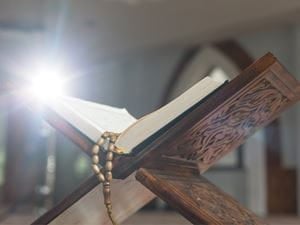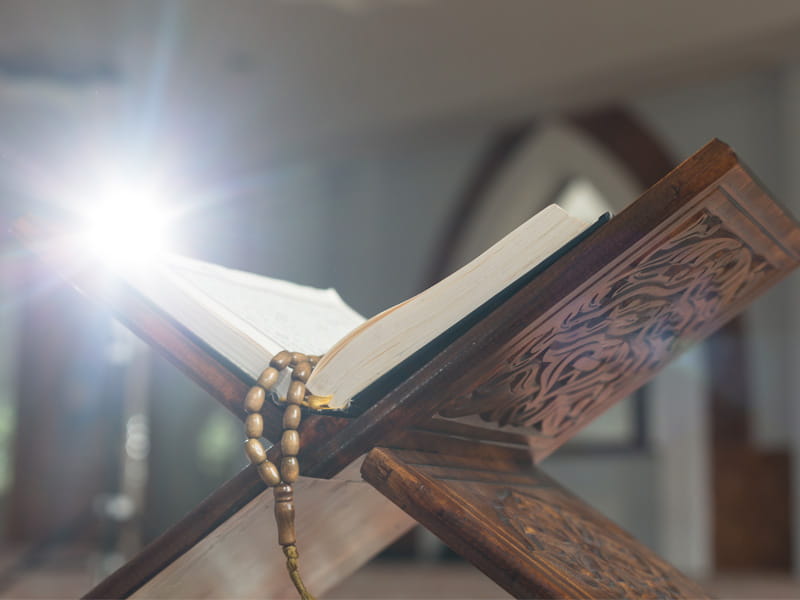
Bilal al-Habashi was one of the closest and most trusted companions of the prophet of Islam, Muhammad. But few know of his humble beginnings.
His story, as all the great tales do, begins with a prophecy.
Bilal al-Habashi was born into slavery in March of 580 AD. The son of an enslaved military commander and Ethiopian princess, royalty and intelligence were his heritage, restrained only by the bonds about his wrists.
Until his mid-thirties, Bilal made a name for himself a slave of unusual skill, herding sheep for his callous master, Abdullah ibn Jud’an, who failed to recognize Bilal’s potential. Abdullah’s steward, however, did see something special in the young man, and called on Bilal to supervise a caravan of Abdullah’s goods, ensuring they reached their destination in Damascus.
The journey was difficult, crossing deserts and dunes. Bilal’s beautifully resonant voice became the joy of his traveling companions, and his spoken poetry relieved the tedium of the expedition.
Along the road to Damascus, they stopped and made camp outside of the city of Bursa. At some point during this time, a member of the caravan—Abu Bakr—experienced an unnamed vision that left him absolutely shaken, anxious for an explanation.
When he entered Bursa, Abu and Bilal sought out someone that might be able to explain the vision, and was directed to Bahira, the most famous Christian priest in the region.
The priest told him the man that his dream was a beautiful one, and that it meant that someone from among his people would be sent out as a prophet, one who would go on to invite people to believe in the One Allah, and to forsake their pagan idol worship, despite resistance from the pagan Arabs.
Bilal was stunned by this, and over the next weeks and months, he began to eagerly anticipate the coming of this prophet, hoping that he might have the chance to shake off the chains of slavery and follow him.
This feeling began to burn in him as he worked, and he soon found that the despair he once felt at his enslavement began to lift. As he tended his master’s sheep in the solitude of the mountains, Bilal found himself, for the first time, mentally free of his slavery. He knew that it was a temporary condition.
He had found hope in the prophecy of the soon-to-come prophet of Islam.
Bilal began to hear rumors of a man who declared that all humans were as equal as the teeth on a comb, and that no one had the right to make anyone a slave.
This man’s name was Muhammad.
Bilal began to sneak out of the city, searching for this Muhammad, whom he had come to admire greatly from the many stories that reached his ears. Long was this search, and Bilal found nothing for quite some time, and eventually gave up, returning to his everyday life of slavery and oppression.
Unknown to Bilal, Abu Bakr—the man who experienced the vision—and the prophet Muhammad had retreated to a cave, to lay low for a time, after facing violence from the pagan Arabs. The pagans opposed Muhammad’s teaching of Islam because the prophet’s teachings stood to disrupt the lucrative trade of idols in the region. And money, above all else, incites the greedy to violence.
Bilal happened upon this cave while tending to his sheep, and Muhammad called out to him.
“O shepherd, do you have some milk you can spare?”
When Bilal saw Muhammad, he knew that they he was special—they he was different, in some way, than anyone he had ever met. He was also shocked that had spoken to him like a normal person—as a slave and an individual of African descent, he had been treated as less than human for his entire life.
There, in that cave, Muhammad shared the divine revelation of Islam with Bilal over a shared portion of milk. It soon became clear that Muhammad’s words could not only free Bilal from slavery, but his heart from the oppression of sin, itself.
There, in that cave, Bilal recited the Islamic Declaration of Faith and became a follower of Islam.
Muhammad then sent Bilal away, urging him to keep his conversion a secret, lest the Meccans kill him for it.
Each time Bilal took his sheep out to pasture, he visited Muhammad in his cave, and each time, he came away with more and more wisdom, leaving only when the sun began to dip below the horizon. He lamented his chains at these times more than ever.
But darkness would soon come for Bilal. His anger at the Meccans’ enslavement of other peoples, and at their worship of idols boiled over one day, and he spat on an idol, calling out, “Debased be those who worship you!”
He was overheard, and a group of Meccans came running. When they questioned Bilal, a strange courage came over him, and he admitted that he had. But that courage lasted only for a moment, and when it flickered out, Bilal ran back to his master’s home.
A huge group descended upon that home and demanded Bilal be handed over, which his master did. The crowd bound him, and to set an example for others who might be tempted to follow the way of Islam, they began to torture him.
Bilal was tied and dragged through the streets of Mecca until he was bloody. He was then taken to the desert, where his limbs were tied to stakes set in the ground.
A man—Umayya ibn Khalaf—stomped on Bilal, screaming for him to verbally renounce Muhammad.
Bilal refused.
He whipped Bilal until the slave passed out, revived him, and whipped him again. He did this nearly until the point of death, torturing Bilal in various ways.
But Bilal still would not budge, shouting out “Allah is One,” whenever he had breath to spare. They exhausted themselves beating him, but they would have sooner gotten the rocks to renounce Muhammad than Bilal al-Habashi.
Finally, Umayya dragged Bilal to an area of sun-heated ground, tying him there and allowing his wounds to burn. Umayya pointed a mound of heavy, hot stones out to the crowd, and had them pile them upon Bilal, crushing him beneath their weight.
But still, Bilal called out, “One! Allah is one!” He would not break. It was the only cry they could draw from this slave. No matter what they did, Bilal found joy in Allah, and Allah was greater than any agony.
The crowd was astonished at his resilience. Some were outright impressed, and their perception of Islam came away changed forever.
When news of this reached Muhammad, he sent Abu Bakr, who, upon arrival, commented to Umayya on the resilience of Bilal, offering to buy him as a slave.
After some haggling, Umayya accepted Abu’s offer, thinking Bilal of no more use.
For the first time, Bilal was free.
For the next decade Bilal accompanied Muhammad on his military expeditions, spreading the knowledge of Islam and being given an important position as a commander of forces, finally putting his intelligence and skill to full use.
He also became renowned for his beautiful voice as he prayed aloud, and had the honor of becoming the first muezzin—one who calls Muslims to prayer from atop a mosque. The tradition of muezzins continues to this day.
When Muslim forces finally captured Mecca—the greatest enemy of Muhammad—Bilal had the honor of initiating what was the first call to prayer ever in Islam’s holiest city.
Bilal, once a slave, now found himself a general, the first to call Mecca into prayer, and one of the closest companions of the Prophet of Islam. He would remain loyal to Islam even after the death of Muhammad, right up until his own death in March of 640 AD, at age 57.
The tall, dark, half-Ethiopian man with the bushy hair and deep, resonant voice leaves a legacy that still greatly affects African Muslims to this day, who feel a special kinship with him, and his story remains one of the chief demonstrations that, in the eyes of Muhammad, all men are equal, regardless of race, nationality, or social status.

